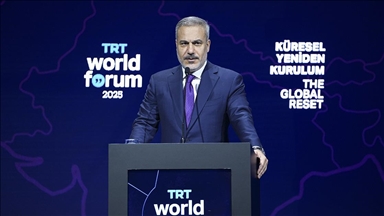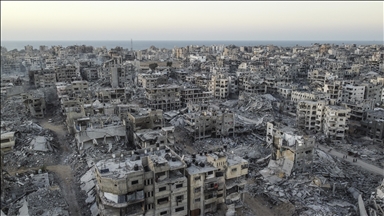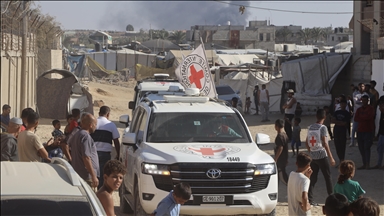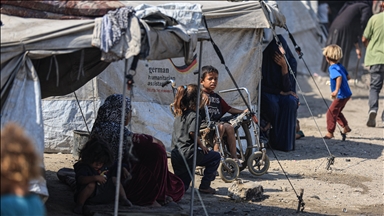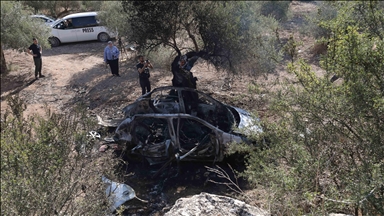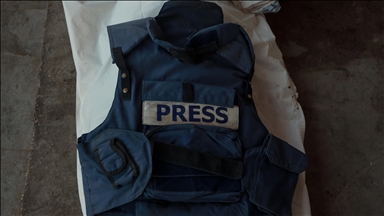Israeli attacks worsen Gaza's vulnerability amid climate change
Israeli aggression worsened situation in Gaza; latest attacks will have serious environmental consequences in long term, expert says
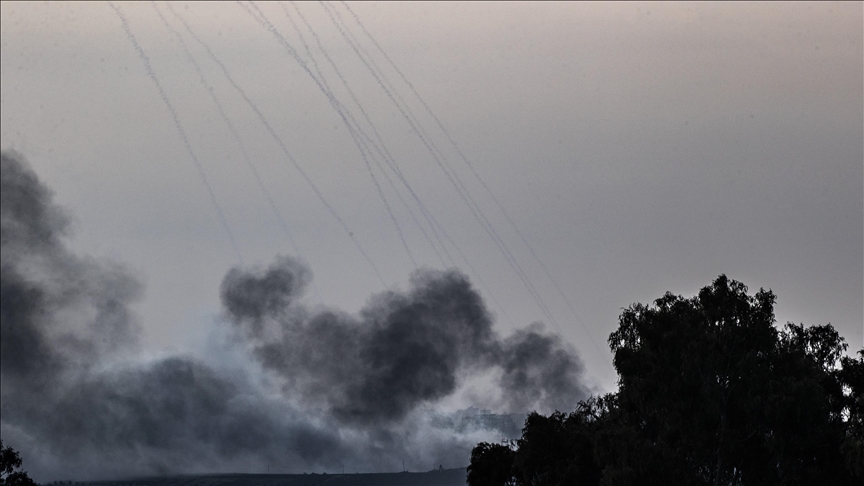
ISTANBUL
Palestinian Environmental NGOs Network Coordinator Abeer Butmeh told Anadolu that the Gaza Strip is reeling from the effects of the global climate crisis, particularly drought.
In an exclusive interview, Butmeh said Israeli aggression has worsened the situation, especially with its latest attacks that will have serious environmental consequences in the long term.
While thousands of civilians have been killed in Gaza, where Israel has continued attacks since Oct. 7, the destruction in the region also brought to the fore an environmental and public health disaster.
Residents in Gaza, who have been badly affected by climate change for years, face difficulties in accessing water resources, especially because of the attacks.
"Restructuring the Israel-Palestine Joint Water Committee," a study prepared by experts from the Massachusetts Institute of Technology (MIT) in 2019, found that the average annual precipitation in the region will fall 10% to 30% by 2100, temperatures will increase by 3 to 5 degrees Celsius, and it will affect the region's agricultural productivity and food supply, causing price instability and food shortages.
In another study, "Options and Strategies for Planning Water and Climate Security in the Occupied Palestinian Territories," published last year by United Nations University academics, it was found that Palestinian territories, which are described as a region suffering from heat, drought and water scarcity, are geographically vulnerable because of climate change.
The study said the water need is largely met by mountain and coastal aquifers and the Jordan River Basin, but most of the resources are under Israel's control, and it is estimated that approximately 80% of the Basin will dry up within decades.
Conflicts exacerbate drought
The study pointed out that ongoing conflicts in the region may directly and indirectly exacerbate drought, disrupt the continuity of agricultural and livestock activities and cause an increase in insects and harmful parasites.
According to experts who conducted the research, Israel specifically targets power plants, water purification systems and water resources in Gaza, and as a result, untreated or partially treated sewage water is discharged directly into the Mediterranean Sea, posing serious threats to public health.
While the World Health Organization (WHO) noted the lower limit of water per person per day is 100 liters (26 gallons), the figure drops to 45 liters in Gaza, 50 in Jerusalem and the West Bank and 20 in some areas under Israeli control.
The average Israeli consumes 369.5 liters of water per day. As a result, 660,000 Palestinians living in Jerusalem and the West Bank have insufficient access to water, while 1 million in Gaza suffer from water scarcity.
The study said water scarcity in Gaza pushed residents to buy more water from private companies, and 97% of the population tried to meet their water needs from unregulated private water tankers and small-scale, unofficial treatment plants.
It said households spend one-third, and in some periods, half of their income on water, and noted that 64% of the population is in poverty and drinking water has become expensive.
Palestine also struggling with drought, lack of rainfall
Commenting on the situation in the region, Butmeh said Palestine is struggling with drought and lack of rainfall due to climate change, and temperatures rise very high in the summer and drop very low in the winter.
Butmeh noted that there has been a decrease in rainfall intensity in the last 14 years, and changes in temperature and rainfall have an effect on crops and groundwater levels.
Sharing the view that Israel's attacks and restrictions increase the region's vulnerability to climate change, Butmeh said: "Israel limits the water resources in the areas under the control of the Palestinian administration, even though it has no authority. Permission must be obtained from Israel for activities such as drilling water wells in the region and building a treatment plant," adding that most requests are rejected.
She noted that Israel allows a small amount of fuel to enter Gaza, which is under blockade.
"Since the energy needs of water treatment facilities cannot be met, these facilities cannot always operate. This means that wastewater is discharged into the sea without treatment. As a result of the discharged wastewater penetrating into coastal aquifers, 96% of the water in the region does not meet the criteria suitable for drinking," she said.
"In addition, the Israeli government has built a dam on the eastern border of Gaza. They suddenly open the dam, causing the agricultural lands to be flooded. This causes destruction to a large part of the agricultural lands and crops in Gaza. The climate crisis is not only natural but also political in Palestine."
"When climate change is combined with Israeli attacks, agricultural lands are drying up because there is no water to irrigate the crops grown there, and therefore, people stop cultivating their lands," she added.
The official further underlined that wheat production was particularly affected, with there was a 10% decrease in production between 2010 and 2020.
Israeli occupation, climate change major threats
Butmeh said the latest attacks will have serious environmental effects in the long term.
"We will see these effects on soil, water, marine habitat, air and, most importantly, on human health. Currently, Israel has cut off the water resources in Gaza and Gaza has run out of drinkable water," she said.
"Palestinians live under two threats: Israeli occupation and climate change," she said.
"We cannot combat the effects of climate change as long as Israel has restrictions. As Palestinians, we are trying to find different solutions to adapt to climate change. As Palestinians, we have the right to water from our own water resources.
"We are struggling to achieve this. Despite all these restrictions, we will continue to work to find a solution. We are doing our best to achieve climate justice in Palestine, but there is no climate justice under occupation," she added.
Anadolu Agency website contains only a portion of the news stories offered to subscribers in the AA News Broadcasting System (HAS), and in summarized form. Please contact us for subscription options.


